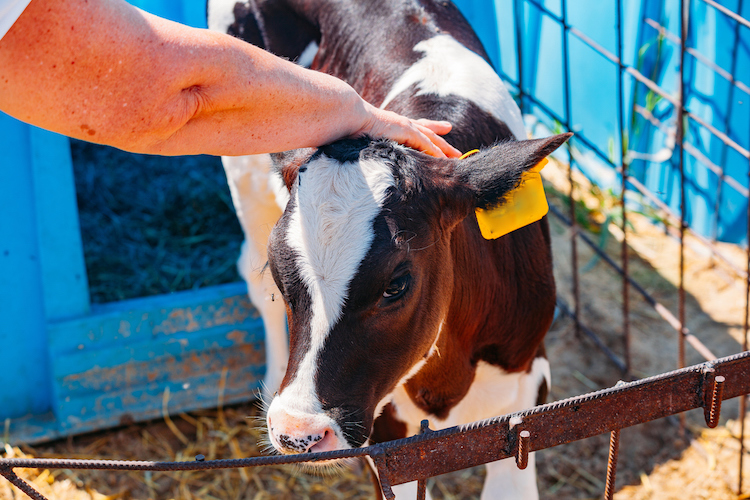
In recent years, research on pair-housing calves has helped the dairy community recognize that calves can benefit from socialization. Pair-housed calves grow as well as or even better than individually housed calves, they display more adaptability, and they may be less stressed. Now, it seems that socialization with humans may benefit calf well-being, too.
In a unique study at the University of Florida, researchers wanted to see if an extra five minutes of human contact time, including neck scratches, reduced the stress of calves being weaned. We cannot know exactly how animals are feeling, but lead researcher Emily Miller-Cushon explained that with calves, stress is often interpreted by observing abnormal behaviors. For calves that have just been fed or are going through weaning, this can include sucking or chewing on their housing environment, bedding, pen mates, or humans, so that is what the Florida team watched in their study.
As for the neck scratches, those were intended to provide tactile stimulation like how stationery brushes provide something to do to calm calves down after feeding. De-stressing can improve rest time because calves are active and seeking that stimulation after eating, said Miller-Cushon. Studies have already shown that cattle are highly motivated to find grooming items, and calves often seek out human contact, they continued.
To study how calves’ sucking behaviors were affected by the five extra minutes of human contact, the team assigned 28 heifer calves to individual or pair-housing at birth. Prior to weaning, all calves received the same amount of contact with humans in the forms of feeding and health exams.
After weaning began at 6 weeks old, the researchers continuously video-recorded the calves for a four-day period. For two of the days, the calves received the amount of human contact they had become accustomed to. Then they received the additional five minutes of human interaction for two days.
In their paper published in the American Dairy Science Association’s JDS Communications, Miller-Cushon’s team reported that when calves were exposed to more human contact, sucking behaviors declined and rest time rose after mealtimes. This was true for both individually housed and pair-housed calves. In individually housed calves, sucking behavior was reduced to what was seen in the pair-housed calves, which highlights the benefits of socialization between calves, too. In pair-housed calves, cross-sucking was also less prevalent.
Less extraneous sucking behavior can be viewed as an indication of calf well-being, and although sucking was not completely eliminated, human contact can be beneficial to calves, concluded the team. Considering the important role humans play in rearing and caring for the physical needs of dairy calves, this research highlights an even greater impact we can have on our animals.

Katelyn Allen joined the Hoard’s Dairyman team as the Publications Editor in August 2019 and is now an associate editor. Katelyn is a 2019 graduate of Virginia Tech, where she majored in dairy science and minored in communication. Katelyn grew up on her family’s registered Holstein dairy, Glen-Toctin Farm, in Jefferson, Md.